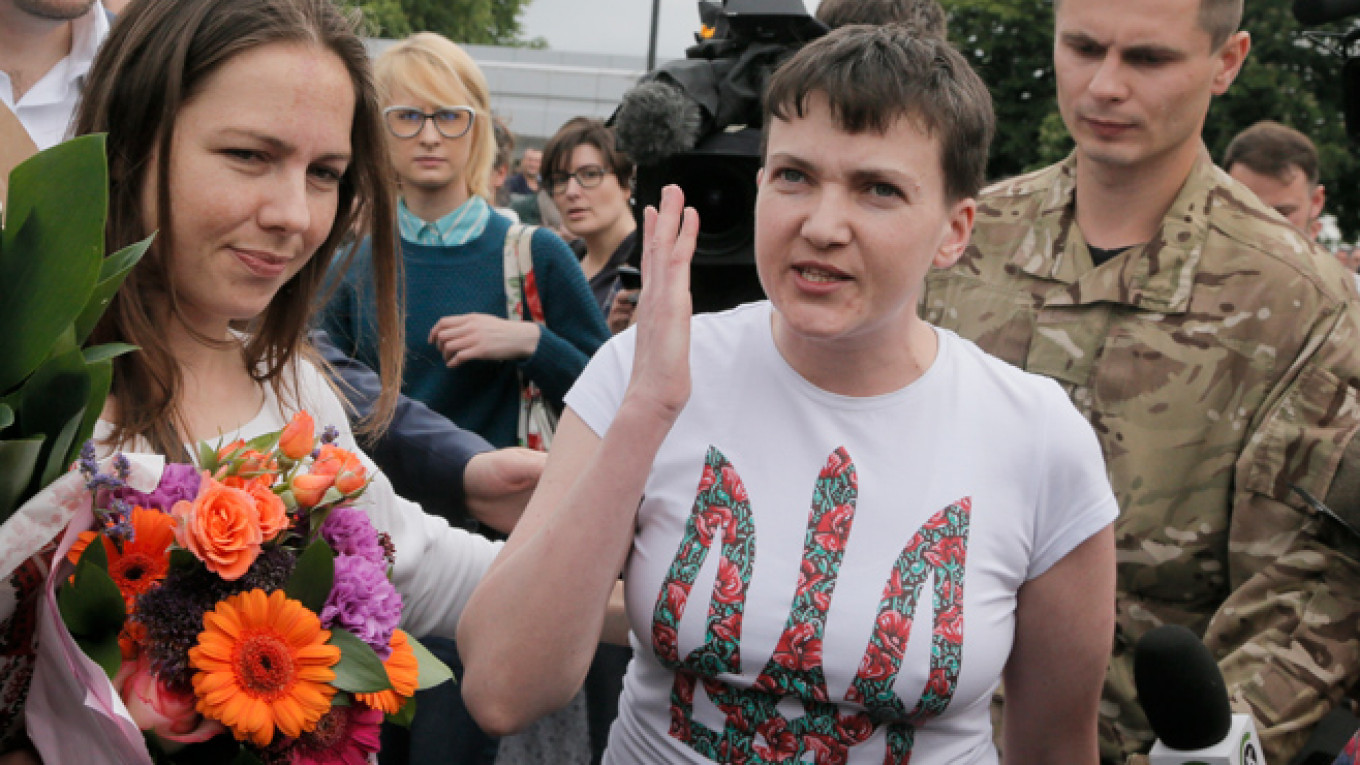The receptions could not have been more different. In Kiev: crowds of well-wishers, multiple TV livestreaming, press conferences, flowers and a medal of honour from the president. In Moscow: a cordoned-off piece of tarmac, state media coverage, out of public eye and under close surveillance.
On Wednesday, May 25, Ukrainian president Petro Poroshenko's plane landed in Kiev with Nadiya Savchenko on board. Just over an hour earlier, the Russian prisoners Alexander Alexandrov and Yevgeny Yerofeyev had set off in the opposite direction. Two flights and months of negotiations, believed to have been concluded two days earlier, when Merkel, Hollande, Putin and Poroshenko tele-conferenced in the so-called Normandy Format.
The legal formula of the exchange became clear soon after the planes set off. Rather than being subject to mutual agreements to serve out prison sentences, all the prisoners would instead receive presidential pardons and walk free.
Russians Alexandrov and Yerofeyev got their pardons only after Poroshenko changed Ukrainian legislation to allow others to apply on their behalf. This allowed the two men to avoid accepting the verdict of a Ukrainian court that they were active Russian officers fighting an illegal war. This would have been unacceptable to the Russian side, which has maintained that the two were acting as private citizens.
Soon after their capture on May 16, 2015, both in fact admitted to journalists that they were serving Russian special forces soldiers. Later, however, they changed their testimony to claim they were no longer serving officers by the time they had entered eastern Ukraine.
The release of prisoners does not "necessarily" indicate any broader breakthrough in the standoff between Kiev and Moscow, cautions political expert Vladimir Frolov. Nor does it suggest any real movement on the peace settlements agreed in Minsk. If anything, violence seems to be picking up, with Ukrainian forces reporting multiple deaths recently.
There are also dozens of prisoners and captives left on both sides. Among them are the Ukrainian filmmakers Oleg Sentsov and Alexander Kolchenko, sentenced to many years of prison on dubious charges of terrorism.
But what the exchange certainly does is allows both sides to feel happy about themselves.
On the one hand, Savchenko was a more difficult prisoner than Moscow could ever have imagined. Her cause was much championed abroad, her stoic image and hunger strikes easily translated into the media screens of the West. Video footage and witness evidence conclusively demonstrated she could not have been a party to the deaths of journalists, of which she was accused. The Kremlin had very little argument to offer in return, and it lost a lot of political capital.
"It was a mistake," says political commentator Alexei Makarkin. "The authorities expected her to break down, but it didn't happen."
Poroshenko, on the other hand, can claim he has made good on his promise to bring a Ukrainian war hero home. Such a breakthrough could not be more timely, with him struggling domestically amid the widespread perception of corruption, cronyism and sluggish reform.
Poroshenko needed this national victory, but it will not come without a cost. Most obviously, he will now have to share political stage with a difficult, but celebrated personality. The returning Savchenko has been described by some as Ukraine's Vaclav Havel. Given her character, Malcolm X may be a better description.
Savchenko will not be afraid to speak her mind. There will be few excuses for Poroshenko's failing government, few reasons not to implement difficult reform and few reasons not to upset the oligarchic balance.
For this reason, Ukrainian politics is in for a roller-coaster ride. Poroshenko has reason to be worried that this victory may become the major headache for his presidency in the months to come.
Contact the authors at [email protected]
A Message from The Moscow Times:
Dear readers,
We are facing unprecedented challenges. Russia's Prosecutor General's Office has designated The Moscow Times as an "undesirable" organization, criminalizing our work and putting our staff at risk of prosecution. This follows our earlier unjust labeling as a "foreign agent."
These actions are direct attempts to silence independent journalism in Russia. The authorities claim our work "discredits the decisions of the Russian leadership." We see things differently: we strive to provide accurate, unbiased reporting on Russia.
We, the journalists of The Moscow Times, refuse to be silenced. But to continue our work, we need your help.
Your support, no matter how small, makes a world of difference. If you can, please support us monthly starting from just $2. It's quick to set up, and every contribution makes a significant impact.
By supporting The Moscow Times, you're defending open, independent journalism in the face of repression. Thank you for standing with us.
Remind me later.






